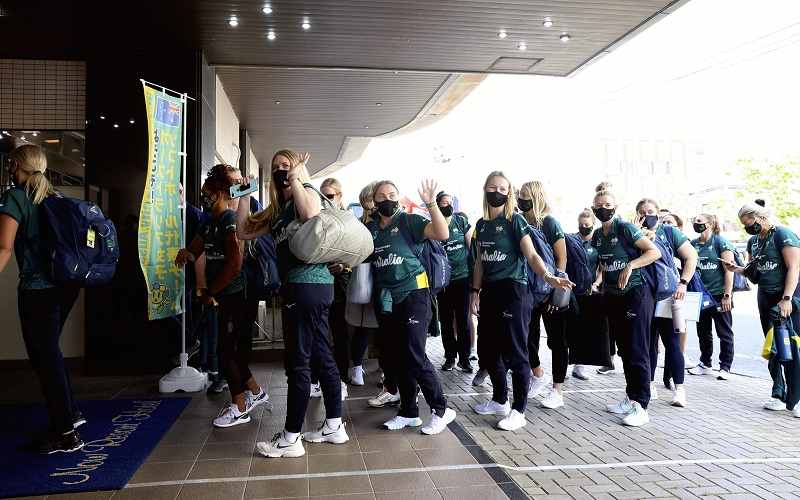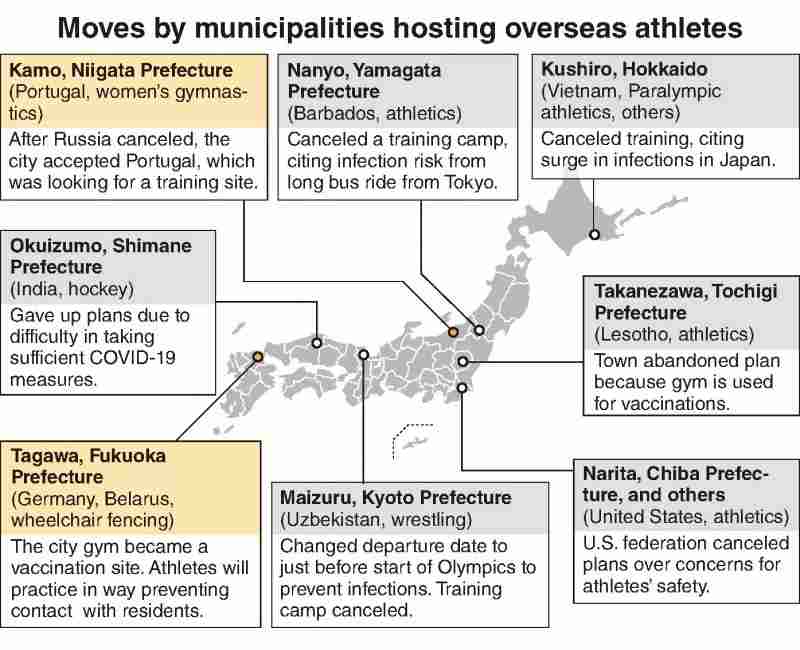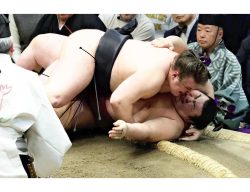
Members of the Australian women’s Olympic softball team arrive at their hotel in Ota, Gunma Prefecture, on Tuesday.
17:50 JST, June 4, 2021
Municipalities that had enthusiastically signed on to host Olympic and Paralympic athletes from overseas are now wringing their hands, wondering how they will manage amid a pandemic still going strong with less than 50 days to go until the opening of the Tokyo Olympics.
More than 100 of these “host towns” have already abandoned their plans, some because the countries themselves have pulled out of the program for coronavirus-related reasons, and at least one because a training site was commandeered as a COVID-19 vaccination site.
Still, a number of municipalities are forging ahead with preparations by implementing thorough virus countermeasures.
On Tuesday, the Australian women’s softball team became the first overseas Olympic delegation to arrive in Japan. Three hours after arriving, they finally got out of Narita Airport after having to take antigen tests for the virus, all of which came up negative.
It was another 2½ hours before they finally arrived by chartered bus in their host city of Ota, Gunma Prefecture, including a bathroom break at an expressway rest area in toilet facilities reserved for them.
At the hotel, the 30 or so members of the delegation are limited to rooms and an eating area on three floors. To prevent contact with other guests, the team uses the service elevator, and enters and exits the hotel through the back entrance. Not only are the athletes and staff subject to daily PCR tests, but also hotel employees and any city officials coming into contact with them.
Travel is restricted to between the hotel and the baseball stadium, and any shopping is done for them by municipal employees. It is the fourth time the city has hosted the Australian team since 2018.
“There is a sense of tension that is completely different from the past,” said one city employee assigned to the team. “The athletes must be feeling the stress, too.”
Disappointing decision
According to the Cabinet Secretariat, there were 528 municipalities registered as host towns as of May 28. Those that have abandoned plans to host overseas athletes, including unregistered locations of training camps, number 105.
For about 70% of such municipalities, the countries they were to host were the ones to cancel the plans.
On May 18, the city of Maizuru, Kyoto Prefecture, was informed by Uzbekistan’s Olympic committee that its wrestling team had called off a training camp there. The team had switched its departure date to just before the Olympics as a precautionary measure.
After the city was chosen as a host town in 2016, it spent about ¥27 million to build a wrestling room and training facility in preparation.
“If world-class athletes had come to the city, it would have been a stimulus for children,” said a disappointed Kazuhito Mimura, the 61-year-old head of the city’s wrestling association.
According to the central government’s guidelines on curbing infection, travel by athletes is restricted to chartered vehicles in principle.
The athletics team and staff from the Caribbean island of Barbados were scheduled to train in Nanyo, Yamagata Prefecture, and had planned to travel by Shinkansen bullet train. But because they would have instead been required to take a five-hour bus trip from Tokyo, they ended up canceling, saying it increased the risk of infection.
For the athletics team from Lesotho in southern Africa, plans to train in Takanezawa, Tochigi Prefecture, were canceled when the town’s gymnasium was transformed into a vaccination site.

Building up trust
The city of Hachioji, Tokyo, intends to go ahead with its plan to host the U.S. sports climbing team from late July as scheduled. The city plans to rent out a nearby gym, and provide chartered transportation between their accommodations and the training site.
Hearing that the athletes, who would be forbidden from going outside, want to have some way to get a change of pace and chill out, the city changed its planned accommodations to a hotel where the athletes can have access to the rooftop.
The Bulgarian women’s rhythmic gymnastics team traveled to Murayama, Yamagata Prefecture, for training camps from 2017 to 2019. A fan club of about 400 residents, which has built warm ties with the team, awaits its arrival this year, and has prepared a Bulgarian flag with messages to be displayed at the Olympics venue.
“The team is coming here even under these circumstances because they trust us,” said a city official who deals with the team. “We hope to live up to their expectations.”
Keiko Komuro, the 71-year-old head of the fan club, said, “We won’t be able to interact with the athletes because of the pandemic, but we hope to convey our support for them in some way.”
Top Articles in Sports
-

Aonishiki Tops Atamifuji in Playoff to Win New Year Grand Sumo Tournament in Ozeki Debut
-

Milano Cortina 2026: Figure Skaters Riku Miura, Ryuichi Kihara Pair Win Gold; Dramatic Comeback from 5th Place in SP
-

Milano Cortina 2026: Kokomo Murase Comes Out on Top After Overcoming Obstacles, Aiming for Greater Heights in Competition
-

Milano Cortina 2026: Riku Miura, Ryuichi Kihara Clinch Japan’s 1st Gold in Pairs Figure Skating, Rebounding from Disappointing Short Program
-

Milano Cortina 2026: Olympics-Torch Arrives in Co-Host Cortina on Anniversary of 1956 Games
JN ACCESS RANKING
-

Japan PM Takaichi’s Cabinet Resigns en Masse
-

Japan Institute to Use Domestic Commercial Optical Lattice Clock to Set Japan Standard Time
-

Israeli Ambassador to Japan Speaks about Japan’s Role in the Reconstruction of Gaza
-

Man Infected with Measles Reportedly Dined at Restaurant in Tokyo Station
-

Videos Plagiarized, Reposted with False Subtitles Claiming ‘Ryukyu Belongs to China’; Anti-China False Information Also Posted in Japan






















